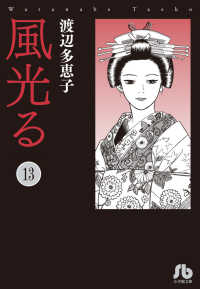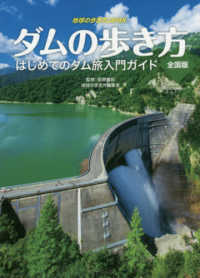- ホーム
- > 洋書
- > 英文書
- > Literary Criticism
Full Description
Mapping the largely neglected history of autofictional literature, and describing developments against socio-historical changes, cultural trends, and philosophical-psychological discussions around self and mind, this book both explores and historicizes autofiction's contemporary boom. Beginning with the genre's emergence in 18th-century England against changes in publishing culture and author concept, and then tracing forms and functions of autofictional literature up to the contemporary moment, A History of Autofiction highlights why select narrative strategies are abandoned, transformed, or repurposed; which forms, affordances, and effects of autofictional modes are persistent; and which were particular to a given period. With focus on salient authors and texts from anglophone autofiction around the world, and shining spotlights on insightful socio-historical and biographical contexts, Alexandra Effe foregrounds autofictional elements of works not previously considered for these dimensions and offers fresh perspectives on a range of canonical autofictional texts.
interdisciplinary in approach, the book sheds light on autofictional phenomena through research in neuroscience, psychology and philosophy of mind while demonstrating that autofictional literature holds insights for cognitive science. Developing a cognitive-holistic approach to the triad of author, text, and reader, the book allows for a novel and more encompassing understanding of an important current cultural trend and of its diachronic development.
Contents
Introduction
What Is Autofiction and What Can it Do?
1. A Cognitive Perspective on Fictionality
2. Autofiction as Cognitive Duality and Textual Doubling
3. Affordances and Effects
Part I: Claiming a Voice - 18th-Century Autofictional Beginnings
4. Marketing a Mutable Author Persona: "Romantick Names, and a feign'd Scene of Action" in Delarivier Manley's Adventures of Rivella
5. Claiming the Right to Self-Publishing and Self-Editing: Alexander Pope's "disguises
[...] of sentiment [and] style"
6. Shaping a Private Self Publicly: Lady Mary Wortley Montagu's Turkish Embassy
Letters and 18th-Century Epistolary Culture
7. Deliberating "ornament of stile or diction, or even of circumstance": Henry Fielding's Journal of a Voyage to Lisbon
8. Living Alternative Lives in Writing: Laurence Sterne and Tristram Shandy "shall lead
a couple of fine lives together"
Coda: From Letters, Diaries, and Transcripts to Books
Part II: Hiding in Plain Sight - Autofictional Experiments of the Long Nineteenth Century
9. Romantic Freedoms in the Search for Generic Conventions
10. Self-Formation within Victorian (Generic) Constraints
The Künstlerroman as Autofictional Hint: Charles Dickens's David Copperfield
11. Fin-de-siècle Transgressions of Identities and Generic Modes
Coda: From Pseudo-Disguise to Explicit Displacement
Part III: Reimagining Selves and Genres - 20th- and 21st-Century Autofictional Innovations
12. Late Modernist Explorations of Genre and Self
13. Postmodernist Self-Creation and Self-Negation
14. Post-Postmodernist Collaborative World-Building
Coda: From Reader Observation to Collaboration
Conclusion
Works Cited








